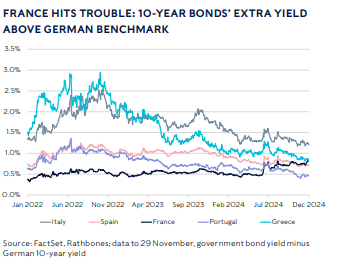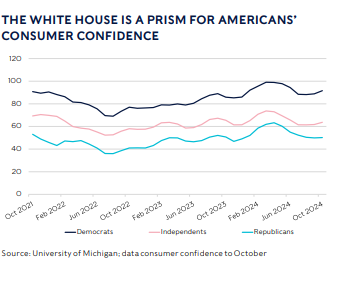
I predict a riot
A PLAN TO SORT OUT FRANCE’S UNSUSTAINABLE STATE SPENDING IS IN JEOPARDY AS ANOTHER GOVERNMENT IS THREATENED WITH DISSOLUTION BY THE PARLIAMENT. MEANWHILE, CHANCES IMPROVE FOR A DECEMBER INTEREST RATE CUT IN THE US.
The French government is teetering as it struggles to pass its Budget bill through the French parliament. Prime Minister Michel Barnier’s minority government has proposed tough measures to right the nation’s dire finances, yet the opposition, led by the right wing Rassemblement National (RN), has demanded big changes to it.
RN leader Jordan Bardella gave Barnier an ultimatum at the weekend, pledging to bring a vote of no confidence in the government if it doesn’t make significant changes. Barnier had originally unveiled a plan to increase state revenues by €60 billion a year (roughly 2% of GDP). The goal is to stop France’s runaway government spending: the gap between spending and tax receipts is now 6.1%, Barnier’s Budget aims to reduce it to 5% next year. Under EU law, this deficit shouldn’t be more than 3% except in unusual circumstances.
According to the government, two-thirds of the €60bn infusion would come from lower-than-planned spending increases on healthcare, unemployment benefits and public servants, while one-third would be raised by increased taxes on companies and the wealthy. That has been challenged by others, however, who think taxes will actually make up almost three-quarters of the Budget measures. This discrepancy has annoyed one faction within the government coalition that wants spending reductions to do the heavy lifting and another which wants taxes to pick up the slack. And both the right and left aren’t happy with the reductions in benefits. In short, it’s turned into a four-way dispute between the left, the right, the centrist government and itself.
Meanwhile, investors in French government bonds are voting with their feet. For years the yield of France’s 10-year bonds has traded around 0.5% above that of its German counterpart. Known as the ‘spread’, this extra return accounts for the greater risk of holding French debt as opposed to German. When France became mired in a political crisis in June this year, that spread spiked to 0.75%. It now has a higher yield than Spain, which has long been considered riskier as a ‘peripheral’ part of the Eurozone. It’s on a par with Greece, long seen as a problem child of Europe.
The French spread is now threatening to break above the levels reached during the 2017 election when fears were rising that RN’s Marine Le Pen would win the presidency. Before that, you have to go back to the eurozone crisis of 2011-12 for even higher levels (when the peak was 1.8%).

Barnier’s administration has already survived one vote of no confidence, that one called by the left-wing opposition just a fortnight after it took power in September. The alliance of several socialist, green and communist parties had won the most seats in the July election, but hadn’t been asked by centrist President Emmanuel Macron to form a government. If the government dissolves again, France’s best hope of addressing its unsustainable finances will dissolve along with it. That would probably send French bond yields – and therefore the government’s borrowing costs – even higher, making the problem worse.
Sooner or later, France will need to fix its roof.
American jobs and inflation
The chance that the US Federal Reserve (Fed) will cut its benchmark overnight interest rate by a quarter-percentage-point at its meeting next week has risen significantly over the week. According to markets that price future interest rates, there’s a 65% probability that the rate will drop to the 4.25-4.5% range. It had been a 50/50 call.
Last Tuesday, the Fed released the minutes of its November meeting (where the rate was cut by a quarter-point). These showed a preference for a gradual reduction in rates as the US economy continued to outpace expectations. The rate-setters had also become less concerned about a cooling jobs market. They were confident that inflation was easing, despite an uptick in September’s CPI reading.
As it happened, the Fed’s preferred inflation measure, core PCE inflation (‘core’ means it strips out volatile food and energy prices), was released soon after the meeting. It marginally accelerated again, hitting 2.8% in October, up from 2.6% in June, which was the lowest reading since early 2021. PCE is a broader measure than CPI, tracking data across rural and urban households. Added to that, it includes some things that CPI doesn’t, such as some healthcare costs that aren’t paid by households directly. It also does more to account for people swapping out expensive items for cheaper substitutes (rice for bread, say). CPI is the most popular inflation variant because it’s more easily comparable with other countries.
Coming up this week is another raft of jobs data, including a measure of worker turnover, wage growth, a couple of estimates of job additions and the unemployment rate. Last month, virtually no jobs were added to the economy after accounting for those lost. But that was heavily influenced by the storm season and these numbers are infamously prone to revision. It’s best to look at the three-month averages and the historic changes that are made once more data is received by the statisticians. As for the jobless rate, it’s forecast to remain at 4.1% for the third month in a row.

As for American households’ view of the economy, they seem rather buoyant – especially about the prospects for the stock market. The Conference Board’s survey asks whether the stock market will be higher or lower in a year’s time. This survey has been going since 1987 and currently the proportion answering “higher” is the greatest it has ever been at 56.5%. The last time it was over 50 was in January 2018.
Another measure of people’s mood is the University of Michigan Sentiment survey. This is the first reading since the election result comes out this week. It will be particularly interesting to see if there’s been a big switch in the view of the economy from those who report themselves to be either Democrats or Republicans. In recent years, your whole economic view has been shaded by whether or not your preferred party’s leader is in the White House...
The views in this update are subject to change at any time based upon market or other conditions and are current as of the date posted. While all material is deemed to be reliable, accuracy and completeness cannot be guaranteed.
This document was originally published by Rathbone Investment Management Limited. Any views and opinions are those of the author, and coverage of any assets in no way reflects an investment recommendation. The value of investments and the income from them may go down as well as up and you may not get back your original investment. Fluctuations in exchange rates may increase or decrease the return on investments denominated in a foreign currency. Commissions, trailing commissions, management fees and expenses all may be associated with mutual fund investments. Please read the prospectus before investing. Mutual funds are not guaranteed, their values change frequently, and past performance may not be repeated.
Certain statements in this document are forward-looking. Forward-looking statements (“FLS”) are statements that are predictive in nature, depend upon or refer to future events or conditions, or that include words such as “may,” “will,” “should,” “could,” “expect,” “anticipate,” “intend,” “plan,” “believe,” or “estimate,” or other similar expressions. Statements that look forward in time or include anything other than historical information are subject to risks and uncertainties, and actual results, actions or events could differ materially from those set forth in the FLS. FLS are not guarantees of future performance and are by their nature based on numerous assumptions. The reader is cautioned to consider the FLS carefully and not to place undue reliance on FLS. Unless required by applicable law, it is not undertaken, and specifically disclaimed that there is any intention or obligation to update or revise FLS, whether as a result of new information, future events or otherwise.
